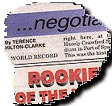

![]()
29 Sept. 2000
By TERENCE HILTON-CLARKE
TOUGH luck for Ato Boldon in the men’s 100 metres final
I mean, the man got an excellent start, running out of lane eight, and he even led the race for a couple of metres. But Maurice Greene was the better man on the night – as blunt and simple as that. Still, at least Boldon now has a well-earned silver medal, an improvement on his bronze effort from four years ago.
Of course, the next thing is to find out whether or not the Santa Cruz native can underline his status as favourite in the 200 metres by winning the half-lap event. Barbadian Obadele Thompson, Nigeria’s Francis Obikwelu and American John Capel represent the select group of threats to Boldon in his attempt to become Trinidad and Tobago’s first Olympic gold medallist in 24 years. But, whatever happens, it is certain that this country’s Olympic experience has gone by in the exact manner that most of us expected it would: Boldon as the lone medal-contender among a group of 23 athletes, divided among the disciplines of track and field, swimming and taekwondo. None of the other competitors has created an impression, thus far, and it does not seem that any will before the closing ceremony on October 2.
Will Athens 2004 be any different? Well, the current trend suggests that it we could be facing the same situation as now: an Olympic contingent centred around track and field, with a few athletes from two or three other individual disciplines thrown into the mix. As pointed out, two weeks ago, this country is not up to mark in any of the team events that feature at the Olympic Games and, in sports such as basketball, volleyball and field hockey, this country may actually not even make it to the respective qualifying competition.
Which is why, once again, track and field is likely to feature in the spotlight in Athens. It should be another sizeable team but, naturally, the composition will be dependent on several factors that will be played out over the next four years. The current squad features several young athletes and the assumption is that they should benefit from this experience. But, one has to remember that the athletes’ progress will also depend on the level of their personal development. Which means top-class training and continued exposure in international meets. It is crucial that the youngest athletes on the team gain access into colleges in the United States and preferably NCAA Division I schools. Boldon, who will be 30 by the time the Athens games roll around, should still be one of the best sprinters in the world by then, and should feature prominently among the likes of Ato Modibo, Nic Alexander, Julieon Raeburn and Fana Ashby. The rest of the team could include several of the current relay runners, plus another generation of younger athletes led, perhaps, by junior sprint sensation, Darrel Brown.
Swimming is another discipline in which this country continues to produce individuals capable of making the qualifying standards, and there should be representation in Athens once again. But, it is uncertain whether any of the competitors will be of medal-earning calibre. Hopefully, 17-year old George Bovell (who trains in Florida) will improve significantly. However, one must remember that there are already many swimmers his age who are two or three seconds faster than he is at the moment. Swimming in Trinidad and Tobago continues to be hampered by the fact that methods of development and training are way below the level that exists in the United States, Australia and Europe. It is also scandalous that, even with a favourable climate, there is only one 50-metre pool in the country (Marlins Swim Club in Westmoorings). The construction of 25-metre and 10-metre pools at community centres across the country represents a waste of time. Competitive swimmers have to be accustomed to performing in a 50-metre pool from a very early age and a commitment must be made to building such pools on a regular basis, so that kids from all over the country can have equal access to this facility.
It is unclear, right now,
as to what other sports this country will be taking part in at the Athens
Olympics. Already, it is noticeable that there are no other top-class
competitors in taekwondo to succeed 36-year old Cheryl-Ann Sankar: a situation
similar to badminton, following the retirement of Debra O’Connor. Of the
current generation of young cyclists, only a few such as Richard Dickie,
Mario Joseph and Emile Abraham may still be competing at the top level
in four years time. Still, qualifying standards in cycling are very tough
and, unless one has access to the proper equipment, technology and training,
there is very little chance. With the hard work that the amateur boxing
board has been putting in over the last three years, maybe there might
be the emergence of one or two boxers by 2004 who may be capable of earning
a spot at the Olympic Games. Otherwise, the pool of likely Olympians is
very small at the moment and one can only hope that, somehow, some exciting
athletes do appear over the next couple of years.
| Back to More Sports Links |




